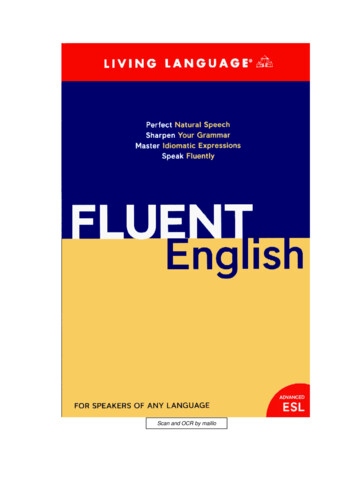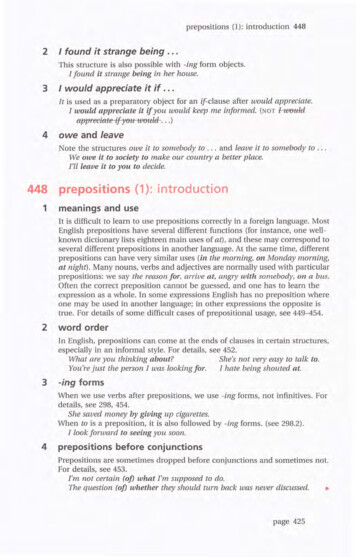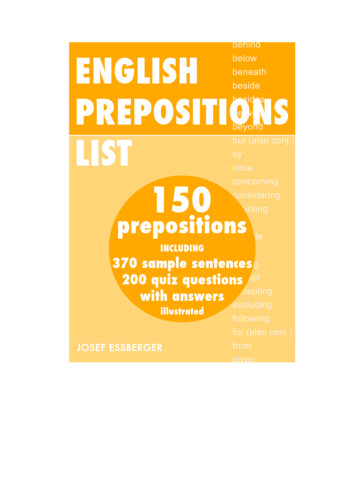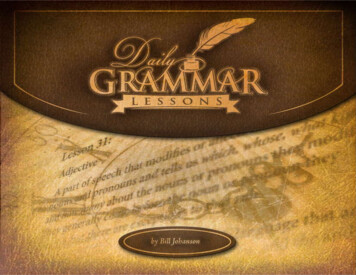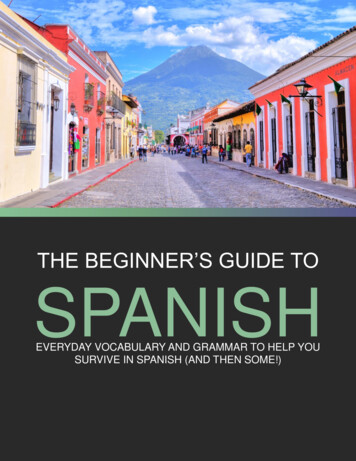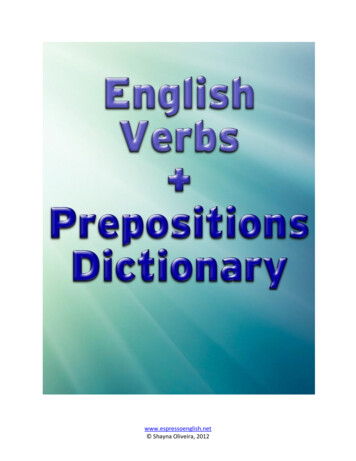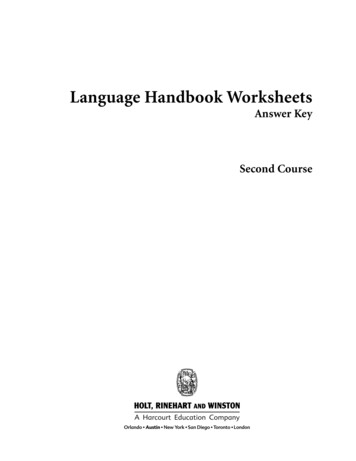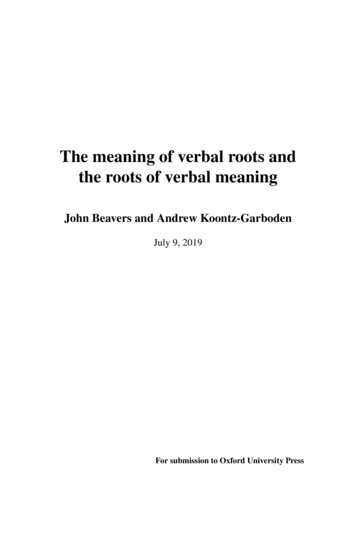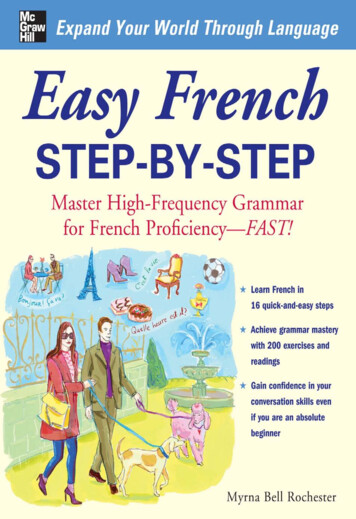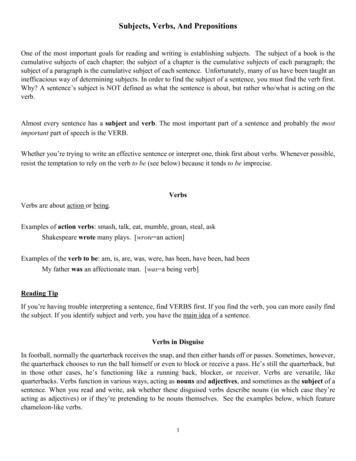
Transcription
Subjects, Verbs, And PrepositionsOne of the most important goals for reading and writing is establishing subjects. The subject of a book is thecumulative subjects of each chapter; the subject of a chapter is the cumulative subjects of each paragraph; thesubject of a paragraph is the cumulative subject of each sentence. Unfortunately, many of us have been taught aninefficacious way of determining subjects. In order to find the subject of a sentence, you must find the verb first.Why? A sentence’s subject is NOT defined as what the sentence is about, but rather who/what is acting on theverb.Almost every sentence has a subject and verb. The most important part of a sentence and probably the mostimportant part of speech is the VERB.Whether you’re trying to write an effective sentence or interpret one, think first about verbs. Whenever possible,resist the temptation to rely on the verb to be (see below) because it tends to be imprecise.VerbsVerbs are about action or being.Examples of action verbs: smash, talk, eat, mumble, groan, steal, askShakespeare wrote many plays. [wrote an action]Examples of the verb to be: am, is, are, was, were, has been, have been, had beenMy father was an affectionate man. [was a being verb]Reading TipIf you’re having trouble interpreting a sentence, find VERBS first. If you find the verb, you can more easily findthe subject. If you identify subject and verb, you have the main idea of a sentence.Verbs in DisguiseIn football, normally the quarterback receives the snap, and then either hands off or passes. Sometimes, however,the quarterback chooses to run the ball himself or even to block or receive a pass. He’s still the quarterback, butin those other cases, he’s functioning like a running back, blocker, or receiver. Verbs are versatile, likequarterbacks. Verbs function in various ways, acting as nouns and adjectives, and sometimes as the subject of asentence. When you read and write, ask whether these disguised verbs describe nouns (in which case they’reacting as adjectives) or if they’re pretending to be nouns themselves. See the examples below, which featurechameleon-like verbs.1
Example: I parked the car. [parked functions as a conventional verb]Example: Parking is difficult. [verb (Parking) functions as a noun and the subject of the verb is]Example: The driver crashed into a parked car. [parked functions as an adjective, modifying the noun car]EXERCISE on Identifying VerbsDirections: Circle the letter that corresponds to the list that has verbs only. Then identify a word from the otherlist that is NOT a verb.1. Which list contains verbs only? Circle the letter that corresponds to your choice.(a) sip, stab, is, are, am, had, grumble, grab(b) sip, stab, is, was, golden, car, bold, filthy2. Identify at least one word that is NOT a verb in 1a or 1b.3. Which list contains verbs only? Circle the letter that corresponds to your choice.(a) crawl, step, were, weigh, feel, need, look, throw(b) am, normally, steer, yesterday, want, ferocious, old, orange4. Identify at least one word that is NOT a verb in 3a or 3b.5. Which list contains verbs only? Circle the letter that corresponds to your choice.(a) under, near, by, with, for, to, bathe, women(b) go, take, reject, accept, understand, ignore6. Identify at least one word that is NOT a verb in 5a or 5b.7. Which list contains verbs only? Circle the letter that corresponds to your choice.(a) gargle, rinse, spit, spray, gush, cleanse(b) slowly, carefully, defiantly, definitely8. Identify at least one word that is NOT a verb in 7a or 7b.9. Add at least two writing-related verbs to the following list, and feel free to consult a thesaurus if you’d like:scribble, write,10. Add at least two speaking-related verbs to the following list, and feel free to consult a thesaurus if you’dlike: tell, relate,2
SubjectsEvery sentence has a subject, which is what the sentence is about. Without a subject, a sentence is usuallyincomplete—a fragment and it’s likely going to be unclear.A sentence’s subject can be a person, place, thing, action, verb, noun—almost anything you can think of. Sincethe subject of a sentence is often a person, place, or thing, and since we know that people, places, and things areclassified as nouns, we tend to think, mistakenly, that any noun we find is the subject. NOT every noun is thesubject.The subject is what the sentence is about—the main idea—but in grammatical terms, the subject is who/whatacts on the verb. If you can find the verb, you can find the subject. If you know the subject and verb, youunderstand the core of the sentence, which is crucial for reading comprehension and analyzing your writing. Thegrammatical subject and verb are the main idea of a sentence.How to Find the Subject(1) First find the verb. (2) Then ask Who/what is acting on the verb? Who/what is verbing?Example: Shakespeare wrote many plays.1. wrote a verb 2. who/what wrote? Shakespeare 3. Shakespeare the subject zzzzz* Trouble SpotSome parts of speech, such as prepositional phrases, seem like subjects, but they aren’t. Some students confuseprepositional phrases with subjects.* ReminderSentences can have more than one subject and verb.EXERCISE on Subjects and Verbs in ContextDirections: Circle the best answer.1. Group work is more enjoyable than individual work.A. work is the verb; group is the subject of workB. is is the verb; individual is the subject of isC. is is the verb; group work is the subject of is3
2. When I work in groups, I talk incessantly.A. incessantly is the verb; groups is the subject of incessantlyB. work is the verb; talk is the subject of workC. work and talk are the verbs; I is the subject of work and talk3. My untrained dog piddles in the house and barks loudly, but my friend’s poodle is house trained and neverbarks.A. untrained is the verb; dog and poodle are the subjects of neverB. dog is the subject of the verbs piddles and barks; poodle is the subject of the verbs is and barksC. house, poodle and dog are subjects; untrained and loudly are verbs4. Although I usually don’t eat sweets, tonight I gorged on chocolate bars, brownies, and butterscotch pudding.A. I is the subject of the verbs eat and gorgedB. Chocolate bars, brownies, and butterscotch pudding are the subjects; sweets is the verbC. There is only one verb in this sentence: eat5. During the summer, Irfan and Marcha traveled to Trinidad, but Julie and Stashanna stayed at home.A. summer is the subject; traveled is the verbB. Irfan and Marcha are the subjects of the verb traveledC. traveled and stayed are verbs; Trinidad is the subject6. Eating smoked sausage makes me ill.A. sausage is the subject; smoked is the verbB. me is the subject; makes is the verbC. Eating is a verb acting as a noun and the subject of the verb makes; smoked is also a verb, and it’s actingas an adjective describing the noun sausage7. Studying the night before an exam is crucial for success.A. before is the verb; night is the subjectB. Studying is the verb; night is the subjectC. Studying is a verb acting as a noun and as the subject of the verb is8. Do you see the poor man on the corner?A. you is the subject; see is the verbB. man is the subject; do is the verbC. corner is the subject; see is the verb9. Using a thesaurus will help you with vocabulary and precision.A. you is the subject of the verb will help4
B. Using is a verb functioning as a noun and as the subject of the verb will helpC. thesaurus and you are subjects; precision and help are verbs10. My favorite part of speech is the verb; my mother’s favorite part of speech is the adjective.A. My and speech are subjects; verb and part are verbsB. part and verb are subjects; speech is a verbC. part is the subject; is is a verbEXERCISE on More Subjects & VerbsDirections: In the space below each sentence, identify subjects and verbs. There might be more than onesubject and verb in each sentence.Example: I snuggle with my puppy.Verb: snuggleSubject: I1. I drove my car too fast.Verb(s):Subject(s):2. She is pretty.Verb(s):Subject(s):3. Spencer studies every night, even when he is exhausted.Verb(s):Subject(s):4. Arguing in front of children causes them a great deal of pain.Verb(s):Subject(s):* Trouble SpotIn most sentences, the subject comes BEFORE the verb. However, some sentences, especially those withprepositional phrases and sentences that begin with “here” or “there” might violate the rule about the subjectpreceding verb.5
5. After I chugged three glasses of water, I belched loudly.Verb(s):Subject(s):6. She laughed, cried, and then screamed when she heard the miraculous news.Verb(s):Subject(s):7. I knew him for only one year, but the professor was a friend and a mentor.Verb(s):Subject(s):8. Nothing smells better than percolating coffee in the morning.Verb(s):Subject(s):9. There is a softshell turtle at the bottom of the pond.Verb(s):Subject(s):10. All this time Sancho had been on the hill, watching his master’s follies, tearing his beard and cursing.Verb(s):Subject(s):*Write a sentence that begins with a verb. Identify the subject(s) and verb(s).Verb(s):Subject(s):6
PrepositionsPrepositions usually appear before a noun or pronoun, establishing a relationship between nouns, pronouns, andother parts of the sentence. Often short words that indicate direction or location, prepositions must bememorized in order to be recognized. One of many very annoying and inconsistent aspects of grammar is thatwe classify some concepts by function (verbs, for example, indicate action/being), but we do not classify others,such as articles (a, an, the) and prepositions that way.Some very common prepositions: at, by, from, in, of, on, to, and with.More Prepositionsabout, above, across, after, against, ahead of, along, alongside, amid, among, as, before, behind, below, beneath,beside, between, despite, during, following, for, inside, near, next, off, onto, out, outside, over, past, through,throughout, toward, under, until, up, upon, within, withoutA PREPOSITIONAL PHRASE is comprised of a preposition and its object. The object of a preposition is anoun or a pronoun.Preposition (in) Object (the water) Prepositional Phrase (in the water)Note that a prepositional phrase can contain articles or adjectives.Example: for the old lady. For preposition, the article, old adjective, and lady nounSince the object of a preposition is a noun or a pronoun, writers occasionally confuse the object of the prepositionwith the subject of a sentence. The subject of a sentence is NEVER in the prepositional phrase.Be aware that sentences can have back-to-back prepositional phrases.Example: You’ll find the keys in the kitchen on the counter near the refrigerator.The preposition to verb is NOT a prepositional phrase. This construction is merely the infinitive form of theverb.·to eat·to drinkIf you want to improve on reading comprehension, add variety to your sentences, and reduce the chance thatyou’ll make a subject-verb agreement error, make sure you can identify prepositional phrases. It’s a good ideato begin some sentences with prepositional phrases in order to emphasize key ideas and create sentencevariety.7
EXERCISE on Identifying Prepositions1. Which list contains prepositions only? Circle the letter that corresponds to your choice.(a) with, for, by, near, under, to, toss, slowly, uncle(b) at, before, of, until, over, past, throughout, during2. Identify at least one word that is NOT a preposition in a or b.3. Which list contains prepositions only? Circle the letter that corresponds to your choice.(a) ahead, during, off, prior, upon, through, along, toward, at(b) across, like, press, inside, down, against, solemn, potato, door4. Identify at least one word that is not a preposition in a or b.5. Using the preposition table at the beginning of this section and your knowledge of parts of sentences (nouns,verbs, adjectives, etc.), create a list of five words like those in questions 1 and 3. Some of the words should beprepositions, but some shouldn’t.A.B.C.D.E.F. Identify at least one word from 5 A-E that is NOT a preposition.6. Is a prepositional phrase ever going to contain the subject of a sentence?7. A prepositional phrase has two main parts: and8. The object of a preposition is usually a or a9. In the space provided, write the words that are NOT part of the prepositional phrases.A. snow on the groundB. soaring high above the earthC. drove with Owen and AnnaD. played near the pear tree10. Write a sentence that begins with a prepositional phrase.8
EXERCISE on Distinguishing Prepositional Phrases, Subjects, and VerbsDirections: Strike through the prepositional phrases in the following sentences. Then identify the subjects andverbs in the space below each sentence.1. A large portion of the proceeds will be allocated for food and clothing.Verb(s):Subject(s):2. On Saturday, I’m going to the mall with Rick and John.Verb(s):Subject(s):3. The stains on the lampshade were produced by a cigarette that you left in the ashtray.Verb(s):Subject(s):4. During the summer, the beach is enjoyable.Verb(s):Subject(s):RememberSometimes an adjective will precede the noun or pronoun in the prepositional phrase as in the following example:with my broken hand. The prepositional phrase includes all words between the preposition and the noun/pronounthat comes at the end of the prepositional phrase. For more on adjectives, see section 1.5.5. In the kitchen, on the counter near the microwave, you’ll find the keys alongside the cookie jar.Verb(s):Subject(s):6. In the evening, I like to drink lemonade and to eat strawberries.Verb(s):Subject(s):7. My brother, along with two of his annoying friends, went with me to the mall on Friday to buy Nikes.Verb(s):Subject(s):8. Across the street from my house lives Boo Radley, a reclusive fellow.Verb(s):Subject(s):9. Upon the brimming water among the stones are nine and fifty swans.Verb(s):Subject(s):9
10. The brutal nurse stuck the needle into the wrong vein, so blood flowed from my arm while she again jabbedthe needle beneath my skin.Verb(s):Subject(s):EXERCISE on Identifying Subjects, Verbs, & PrepositionsDirections: Circle the letter that corresponds to the best answer.1. Near my house you’ll find a waste management facility. You’ll smell it too.A. The sentence begins with a prepositional phraseB. my house is the subject of the sentence2. Blowing in the wind is the answer.A. the wind is the object of the prepositionB. The sentence begins with a form of the verb to be3. He was living just enough for the city.A. for the city is a prepositional phraseB. He is a verb4. Are you a lucky little lady in the city of light, or just another lost angel?A. The sentence begins with a form of the verb to beB. The sentence does NOT have back-to-back prepositional phrases5. I am the king of rock—there is none higher.A. The subject of the sentence is rockB. rock is part of the prepositional phrase, so it can’t be the subject6. Out here in the fields, I fight for my meals.A. fields and meals are subjectsB. fields and meals are objects of prepositions, so they can’t be subjects7. Your plans have come to naught, and your life is half a page of scribbled lines.A. The sentence ends with a prepositional phraseB. scribbled lines is the subject of the sentence8. The mass of people lead lives of quiet desperation.A. people is the subject of the sentence10
B. lead is a verb9. I get by with a little help from my friends.A. I is the subject of the sentenceB. my friends is the subject of the sentence10. After skiing, my girlfriend and I sip hot chocolate near the fire.A. fire is the subject of the sentenceB. my girlfriend and I are the subjects of the sentence11
3. My untrained dog piddles in the house and barks loudly, but my friend's poodle is house trained and never barks. A. untrained is the verb; dog and poodle are the subjects of never . B. dog is the subject of the verbs piddles and barks; poodle is the subject of the verbs is and barks . C. house, poodle and dog are subjects; untrained and loudly
